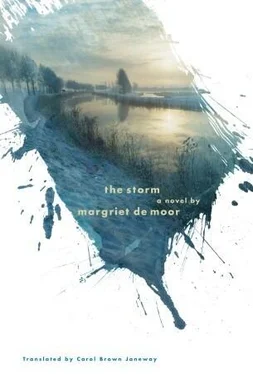“Just a moment,” Armanda had said, reaching for a packing chest so that she could sit down. Bent over next to Nadja, she was better able to look at the picture, and did so, suppressing the first, instantaneous, strong impulse to tell her adopted daughter straight out, without the slightest psychological subtlety: “That’s your real mother.” She knew the corner from which the photo had been taken, the year before it had been snapped, she had after all been there herself. From the Winter Garden of the Hotel Kirke, you look into the reception room with the tables laid. There are draperies to either side of the staircase, and there’s a palm tree. Given the backdrop, you wonder what the two people in the foreground, in adjacent wicker chairs, have to celebrate in such a grand way: the little gap-toothed girl, laughing shyly, and the woman, Lidy, with eyes that look slightly tragic because of the lack of lighting, and a smile around the lips that you’d have to know in order to interpret as “All very nice, but tomorrow I’ll be home again.”
“That’s your real mother,” said Armanda.
“Goodness!” said Nadja.
That is how it happened.
In the fishing village of Bruinisse, on the Grevelingen, a complete working harbor had been built to block off three miles of water by means of a dam. It was late in the morning. Sjoerd Blaauw, like a tourist, politely stopped a workman in overalls and boots to ask if they were making good progress.
“Let me through, friend!”
Quite right. He took a step to one side and lost himself for a moment in contemplation of the phenomenon in gray and blue-white, the two in spectacular contrast to each other, and which he would have loved to have explained to him. Gray was the color of the quays (which were also loud and dusty), full of asphalt, steel cables, blocks and tackles, trucks, and machines that looked like military equipment, and gray was the color of the contours of the construction site a little farther off, in which a tide lock 450 feet long by 55 feet wide was already in operation, and also the portion of the dam that was slowly advancing from Flakkee. The row of caissons lying ready in the water next to the quay were also gray, a beautiful example of hydraulic engineering to instill respect, but naturally a joke, a child’s toys compared with the Phoenix-A-X caissons, as tall as high-rises, which would shortly be sunk directly at the edge of the sea in an opening several hundred yards wide by fifteen yards deep with a tidal range of eighteen feet. With a warm breeze in his face, Sjoerd looked up high. Blue-white (the quiet, independent, comfortable, tolerant blue-white that their national culture demands) was the color of the all-encompassing cloudy sky of the Dutch Masters above it.
A faint feeling of dizziness. His eyes moved down again. At an angle to the quay, with its bow toward the caissons, was a ship the color of red lead, a totally normal domestic ship with a cabin, named Klazina . Sjoerd turned to a man wearing a greenish leather jacket and tugged on his sleeve.
“No, back here,” the man answered in response to his question as to why the dangerous arm of the sea was not being blocked off directly at the shoreline.
“But why?”
The man adopted a more comfortable stance as he explained to Sjoerd about the separation of the floodplains of the Grevelingen and the Oosterschelde. And about the injection of millions of cubic yards of sand, the building of entire asphalt mixing plants on-site, a foreign cable railway in our polders and watery lands, and about piers and caissons and abutments and swing bridges and sluices in the Haringvliet, where enormous shields would be steered from seventy machine rooms…. “Oh, mister, have you ever thought that the nightmare of ’fifty-three, back then, was the beginning of a damn magnificent dream?”
“Dream?” Sjoerd’s face had taken on the well-known expression of schoolboys and students who want to learn the mandatory stuff for a test, while their hearts, otherwise occupied, do what hearts want to do: swell to bursting.
When did my wife doesn’t understand me begin to echo in his ear again, like the line of a poem? When his eyes turned away to look at the powerful little ship that was in process of taking one of the caissons in tow, a red ship with a deckhouse on top and a name that was the only female presence in this world of men— Klazina?
“So, would you like to come along?”
The man, about to say good-bye, had noticed what the other was looking at.
“Can I … could I really?”
“We’ll fix it.”
Not long afterward he was standing on the foredeck of the little tug. Sjoerd, on the water again where he’d been once before. Noticeably calmer, the water, noticeably bluer than it had been when it engraved itself in his memory. Close behind him they were busy with chains and winches, was he standing in the way? No, the crew paid no attention to the strange, tall, blond fellow staring at the expanse of water as if he were staring at a world that had long been denied him. All the same, a boy brought him milky coffee in a pale pink mug, said, “Please!” with quiet warmth, and let him alone again with the vibrations under his feet. He lit a cigarette. The water between Bruinisse and Oude Tonge glittered, reflections, shouted orders, echoes: everything, all of it, exactly mirrored — even if in a fashion one couldn’t have guessed — the words he had woken to this morning.
Lidy, look at me. Do you remember how we went to Ouderkerk? You were already weeks late with your period. View of the bend in the Amstel. Freeze-frame of Rembrandt, down on his knee, drawing this view. And you with your news. Do you remember how I got the fright of my life, and you turned around to pick some flowers and to murmur: “What I’d like is …”
“Yes?”
“Is for you to make the same face you made back then when you caught that pike.”
We sat down on a bench at the entrance to the Amstel park.
That evening Sjoerd went on a date and cheated on his wife for the first time, and it isn’t clear that the one thing — his experiences of the day — had anything directly to do with the other. It simply happened that as he sat down in Amsterdam in the wonderful evening air on the café-terrace of the Hotel Americain, he made eye contact with a woman who happened to be passing. Slender, wearing a green dress. Who next moment was coming to sit next to him at the round table. Large, shiny shopping bag on the ground between their chairs.
“Good?”
Sjoerd had ordered a glass of claret for her too. The weather had ignored the forecast on RNMI all day. It was warm and wonderfully sultry.
“Mmmm.”
Not the slightest awkwardness between them. What did you do today? His question to her, slightly narrowed eyes. Worked (in some institute), bought shoes (in the bag), talked to old friends on the phone (in Vienna). Like a woman letting her fantasy run at the first meeting, she didn’t look at him directly; instead her eyes seemed to go through him to someplace behind him, as if through a fog.
“And you?”
He began to talk about the construction in the delta as if he’d been waiting for this opportunity, his voice unusually emphatic and excited. And she listened, her arm next to his on the table, and twisted her wrist, because everything was already conspiring to have their hands end up on top of each other. (Later she would tell him she had fallen that evening for “the gleam” of his desire, his masculinity without even a trace of typical Dutch dullness in the way he looked at her or the way he spoke.)
“More than a billion cubic yards of seawater with every tide!” he almost shouted, telling her about the Oosterschelde. “They close it with a forty-foot-high dam smack up against the sea! Don’t think that’s easy, it involves an estuary with a mouth more than six miles wide! First they import enough sand to create three new islands, then in the channels the wild current forms as a result, they build thirteen gigantic towers on sills of steel and reinforced concrete cased in stone!”
Читать дальше












